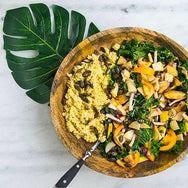Words by Linia Patel
Gut bacteria has become big business in recent years. Not only are new 'gut-friendly' foods popping up on supermarket shelves and in trendy cafes; we are also hearing much more about the powerful effect of gut bacteria on our health and wellbeing. It seems this is only the beginning, and unlike many food trends this is one that might actually be worth jumping on board.
Physiology of the gut
Our gut is probably one of the most important organs in the body. It is the long tube that starts at the mouth and ends at the anus. It is involved in the initial processing of food (once it enters the mouth), to the storage, absorption, digestion and then passing of food as faeces.
In the last decade, scientists have discovered that within your large intestine (your bowel) are trillions of different types of bacteria, fungi and viruses, which collectively make up your gut microbiota (used to be called gut flora).
It is this ecosystem of microbes that have started to turn heads as they are thought to be an important contributor to good gut health. A healthy gut microbiota enhances the way we absorb nutrients and vitamins and converts some of the food we eat into more valuable by products.
What’s the fuss about?
Studies show that the influence of your gut microbiota is far from local. The reason for this is because your gut is actually the gatekeeper for your inflammatory response. Inflammation tends to be a hallmark of most chronic diseases. For example, diseases such as inflammatory bowel syndrome, autism, obesity, allergies, autoimmune, depression and cardiovascular disease are increasingly being linked to the gut microbiome.

Getting the right gut bacteria balance
You host a balance of good and bad bacteria, but the composition can vary greatly depending on several factors such as genetics, geographic location, diet, lifestyle, stress and medications. Besides antibiotic treatment, diet is the environmental factor with the greatest impact on the microbiome.
One of the quickest and easiest ways to improve your gut health is via your diet, as the microbes in your body consume on the same foods you do. Simply speaking, PRO-biotics are live good bacteria and PRE-biotics are the food for the good bacteria. When combined together they are known as syn-biotics because of their synergistic effects.
Both probiotics and prebiotics can be found naturally in a range of foods:
- Probiotics are found in bio-live yogurts, kefir (fermented milk drink), kimchi (fermented cabbage), natto (fermented beancurd) and my latest addiction - kombucha (fermented green tea).
- Prebiotics are types of dietary fibre that are found in foods like oats, legumes, onions, cabbage and asparagus.
The theory behind probiotics and prebiotics is that good bacteria thrive on fibre. They ferment soluble fibre and the by-products (i.e. short-chain fatty acids) of this fermenting activity helps nourish the cells lining your colon. New research in mice shows that when microbes in the gut don’t get sufficient fibre, they begin to eat away on the natural layer of mucus that lines the gut which predisposes the gut to a leaky gut and a whole range of other diseases. In saying that, it is important to remember that this area of research is still growing, so there is a lot for us to still learn and understand.
This last point is definitely worth noting. I hate to be the bearer of bad news, but when it comes to many of the fermented products out there, there have been no good quality studies (known as randomised controlled trials). No quality studies doesn’t mean there are no benefits, it means that we need to do more studies to really understand the benefits. So for now, when it comes to the health claims being made with many gut health products out there (kefir, kimchi, kombucha etc), don’t believe everything you read.

10 steps to improve your gut health:
- Encourage diversity. Mix it up. Don’t always just eat the same fruit and vegetables over and over again. Including new foods (particularly fruit and vegetables) to your diet encourages a wide range of healthy gut bacteria to flourish.
- Don’t cut out carbs. Whole-grain carbohydrates are a good source of fibre. High fibre like oats and barley will give you plenty of prebiotics to allow your “gut garden” to grow.
- Go meat-free a couple of times a week. Diets containing too much meat and fat can induce dysbiosis (a microbial imbalance). Plant-based foods encourage a healthy balance of bacteria.
- Keep your sugar and sweetener intake in check. Refined carbohydrates, sugar, sweeteners and processed foods create an environment in your gut where bad bacteria thrive.
- Experiment with fermented foods. While these foods are marketed as miracle foods (no such thing), if you enjoy the taste of fermented foods such as bio-live yogurt, sauerkraut, kefir, kombucha, tempeh, miso soup and fermented vegetables in your diet then this may have some benefits on your gut health.
- Drink in moderation. Excessive alcohol intake can also disrupt your microbial balance.
- Manage stress. Your gut is intricately linked to your state of mind, so stress affects your gut in an unhealthy way.
- Move. Exercise helps to regulate bowel habits and particularly helps those prone to constipation. Exercise is also associated with greater microbial diversity. If you do intense exercise, you may want to support your gut by taking probiotics.
- Open your windows. Germ free living may not be in your best interest. Exposure to bacteria and viruses can serve as “ natural vaccines” that strengthen your immune system. Simply opening your windows and increasing natural airflow can improve the diversity and health of the microbes in your home, which in turn will benefit you.
- Know when you get help. If you are suffering with gut symptoms or have a family history of coeliac diseases, bowel cancer or ovarian cancer you may want to speak to your GP or a registered dietitian or nutritionist.
References
- Sekirov, I, Russell, SL, Antunes, LC, Finlay, BB: Gut microbiota in health and disease. Physiological reviews, 90: 859-904, 2010.
- Heiman, ML, Greenway, FL: A healthy gastrointestinal microbiome is dependent on dietary diversity. Molecular metabolism, 5: 317-320, 2016.
- Graf, D, Di Cagno, R, Fåk, F, Flint, HJ, Nyman, M, Saarela, M, Watzl, B: Contribution of diet to the composition of the human gut microbiota. Microbial Ecology in Health and Disease, 26: 10.3402/mehd.v3426.26164, 2015.





























































